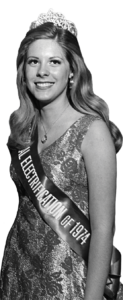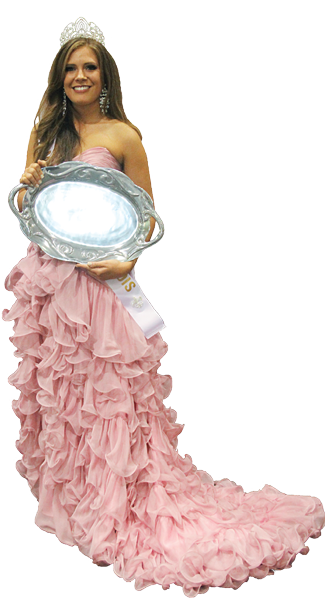 Under the heat of bright lights, several women in stunning formal gowns with perfectly coifed hair stand on stage, nervously holding hands. One can almost taste the anticipation as a booming voice announces, “And the winner is …” Then there’s that pause when every pageant finalist holds her breath until a name, hopefully hers, is announced. And oh, the changes that win will bring.
Under the heat of bright lights, several women in stunning formal gowns with perfectly coifed hair stand on stage, nervously holding hands. One can almost taste the anticipation as a booming voice announces, “And the winner is …” Then there’s that pause when every pageant finalist holds her breath until a name, hopefully hers, is announced. And oh, the changes that win will bring.
In the 1950s through the 1970s, nearly every electric cooperative in the state held a beauty pageant at their annual meeting. Some co-ops, such as Southern Illinois Electric Cooperative in Dongola, continued the practice until a few years ago. Local co-op pageant winners would represent their co-op at the state pageant, sponsored by the AIEC, for the title of Miss Illinois Rural Electric Co-op. Those young ladies crowned at the state competition would compete on the national co-op stage for Miss Rural Electrification, sponsored by the National Rural Electric Cooperative Association (NRECA).
Rural electrification had always been male-dominated, but pageants helped bring women to the forefront. Those who were crowned pageant queens were the new fresh faces of the co-ops, and became public figures. Donning their crowns and sashes, they represented the co-ops at local events and spoke at charity events and conferences. They broadened their horizons, and became positive role models for other girls. The first pageants helped young ladies prepare to become homemakers. Later pageants stressed attending college and pursuing careers.
In 1973, Kathy Harriss, now known as Kathy Land, was a shy girl from rural Fairfield, and a reluctant co-op beauty pageant contestant. She explains, “I got into this pageant when Ivan Holler, a friend of mine who worked at Wayne-White Counties Electric Cooperative, asked if I would do this. I thought, ‘Okay, sure.’ It was a chance for me to wear a long dress, and I thought that would be really nice.” Then reality hit. “It wasn’t until closer to the time of the pageant that Ivan told me I had to wear a swimsuit,” she says, laughing. “Had I known that, I probably would never have done it.” She won the pageant, and this set the course for an adventure no one, including her, could have predicted.
Later that year, excited but a little nervous, Land competed in the Illinois state co-op pageant in Springfield. Representatives from Wayne-White and the AIEC, who accompanied her there, helped ease some of her fears. That support, and the pageant coaching she received there, boosted her confidence. She says, “We had to practice, and for a lot of us, that was something new because we had never experienced something like that.” It all paid off. She was crowned queen at the statewide competition, and even got to meet then Governor Dan Walker.
Between the pageants, her life was a flurry of speaking engagements and public appearances. In early 1974, she was off to San Francisco to compete in the national pageant. It was a whirlwind of excitement there, and Land enjoyed modeling and makeup lessons, and city tours with other contestants. However, a series of unnerving events occurred before and during the pageant. “The night of the pageant was probably one of the worst nights of my life,” she laments. “I had extremely thick hair that took hours to fix. By the time they finished, it was one huge bubble. It was terrible.” And in her mind, things went downhill from there. In her first appearance at the pageant, she got rattled when she stumbled on stage in front of the judges, then got tripped up on one of the judge’s questions.
She says, “I couldn’t wait to get off that stage. I knew I blew it, so I wasn’t really paying attention when they announced the winner. I heard them say ‘Illinois’ and I remember being happy that the state of Illinois had won. It took me a few seconds to realize ‘oh my gosh, that’s me.’ It was so exciting.” She was so grateful for her good fortune, and before she left San Francisco, she gave roses she was presented on stage to the other contestants to whom she’d grown so close.
Later in 1974, Land’s co-op pageant adventure yielded another surprise. The Philippines, whose National Electrification Administration had been established in 1969, was hosting its first national beauty pageant. NRECA representatives asked if she’d be willing travel there and help with it. Her mother was invited to accompany her, and the answer was, of course, yes. Although the pageant would only last a week, they were asked to stay for a month and experience the country’s culture.

In July 1974, Land and her mother flew to the Philippines, and were greeted with a celebrity’s welcome. Soon after their arrival, they were honored to meet Philippine President Ferdinand Marcos and his wife Imelda at their palace.
The pageant was exciting, yet exhausting. Land enjoyed the time she spent meeting and getting to know the pageant contestants. Since this was their first pageant, there were a lot of questions. She was able to pay forward the valuable advice and guidance she’d received through her pageant experience. “Like most pageants, you go through lessons. I had a great responsibility because I was representing our country.” She was gratified to have played a part in their country’s inaugural event.
The Miss Universe pageant was also being held in the Philippines, and it was assumed she was part of its entourage. She says she “got the royal treatment.” She explains, “When I landed at the Philippines, I didn’t go through customs. They just took me to this lounge and did all the paperwork and took care of my luggage. It was wonderful.” Other perks included special side trips, extravagant dinners and attending the Miss Universe pageant.
Land and her mother visited so many beautiful areas of the Philippines, but some were quite remote, and travel could be challenging. To complicate matters, the country was under martial law. Land explains, “One time, we were supposed to travel to a location by military helicopter but plans had to change because we could have been shot down.” Fortunately, a private company provided a helicopter for the trip. She says, “When we were landing, there was circle around us of soldiers with guns.” Once they touched down, the soldiers left but it was still a bit unnerving. Another time, they flew in a small plane that experienced a lot of turbulence, and nearly everyone on board became ill.
As Land toured the country, she could see that the Philippines lagged significantly behind the U.S. in electrifying their rural areas. Seeing the residents’ excitement over it made her realize what it must have been like before rural Illinois had power. She was asked during interviews how she thought electrification had changed the Philippines. She assumed people were excited to have it because it made their lives easier, and she was right. However, there was another motivation. So much of Philippine culture involves music and dancing, and electricity brought new access to music in the rural areas. As she traveled through the countryside, she was surprised to see grass huts with jukeboxes on their porches.
Land and her mother were so warmly welcomed everywhere they went in the Philippines, and she recalls feeling extreme sadness when they departed. She returned home with boxes of gifts from the generous Philippine people and fond memories of an amazing journey.
An article with a photo, detailing her experiences in the Philippines appeared in her local newspaper, triggering the best surprise of all. David Land, who was about to return from two years in the U.S. Army, had seen her picture in the paper and proclaimed to his mother that he was going to marry “that girl.” When he returned home, he asked her on a date, and exactly six months later after a whirlwind courtship, they wed. Wayne-White Counties Electric even gave her a wedding shower.
It’s amazing to think that Land’s life-changing journey started on the stage of her local co-op’s annual meeting. The pageants took her out of her comfort zone and opened doors to a whole new world. After being on stage for so many different speaking engagements, the formerly shy girl attended college and earned her teaching degree. She taught fifth grade for more than 20 years, is now retired and lives with her husband in Fairfield. She can’t thank Ivan Holler, Wayne-White Counties Electric Cooperative, the AIEC, and NRECA enough for giving her an experience that was about so much more than winning pageants.
Janna Harner
Beauty and brains: a winning combination
 Like Kathy Harriss Land, Janna Harner of Dongola got her pageant start through an electric cooperative. Harner grew up on Southern Illinois Electric Cooperative (SIEC) lines. Her family believed in co-op values, and stressed the importance of attending SIEC’s annual meeting and participating in the decision-making process.
Like Kathy Harriss Land, Janna Harner of Dongola got her pageant start through an electric cooperative. Harner grew up on Southern Illinois Electric Cooperative (SIEC) lines. Her family believed in co-op values, and stressed the importance of attending SIEC’s annual meeting and participating in the decision-making process.
A highlight of the meetings was always the annual SIEC Beauty Pageant. The pageant comprised three parts; interviews, and the swimsuit and evening gown competitions. As a little girl with big dreams, the first time she saw those beautiful girls on stage, Harner was hooked.
When Harner was young, her sister Jenna won the SIEC pageant, and talked Janna into giving it a try. Her big sister had lots of advice for her, and coached her well. When Janna competed in 2012, she was first runner-up, and in 2013, she took the crown.
Janna says the SIEC pageants had some humorous moments. She and Jenna looked very much alike, which at times could be confusing. In 2012, as the contestants got ready for the pageant, a photographer from the newspaper came backstage to take some candids of them. A photo of Jenna helping Janna apply her lipstick ran in the newspaper and the girls’ names were reversed in the cutline.
In 2013, she had a wardrobe malfunction. As she was undressing, her dress zipper got off track, and she simply couldn’t make it budge. She had to be cut out of the dress with an Exacto knife. She laughingly says, “Yeah, here’s the new queen. I had my eyelashes on, and my hair was done, and someone was cutting me out of my dress. You could not even come up with something like that.”
Janna, an excellent student, always planned to attend college, and winning the SIEC pageant gave her a great start. The prize for winning was a $1,000 scholarship. A $500 scholarship from SIEC followed for being an outstanding student attending Shawnee Community College. In 2014, she won a $1,500 scholarship from the Thomas H. Moore IEC Memorial Scholarship program through the Association of Illinois Electric Cooperatives in Springfield.
There have been many other pageant wins along the way. Two years ago, Harner was fourth runner up in the Miss Illinois America pageant. In January of this year, she won the Miss Southern Illinois pageant title, then later won second runner up in the Miss Illinois America pageant. And more wins could come as she has several more years of eligibility to compete.
The scholarship money she has received from her pageant successes is helping this brainy beauty pursue her dreams. A senior at Southeastern Missouri State University, majoring in literature and minoring in math, she plans to work toward a post graduate degree to teach at the university level.
Of all her pageant wins, Harner says her SIEC pageant title is especially meaningful because of the local tie. She explains, “It’s about representing the people in your local community-the love for one another. It was the same community spirit that brought electricity to rural Illinois. As Miss SIEC, I got to be part of that legacy.”








